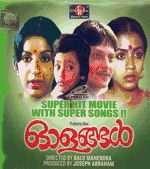Olangal
Olangal is a 1982 Indian film in Malayalam, directed by Balu Mahendra.[2] The film's plot is inspired from novel Man, Woman and Child by Erich Segal.[3]
| Oolangal (The Ripples) | |
|---|---|
 | |
| Directed by | Balu Mahendra |
| Produced by | Joseph Abraham |
| Screenplay by | Balu Mahendra |
| Starring | Amol Palekar Poornima Jayaram Ambika Adoor Bhasi Anju |
| Music by | Ilaiyaraaja |
| Cinematography | Balu Mahendra |
| Edited by | D. Vasu |
Release date |
|
| Country | India |
| Language | Malayalam |
Synopsis
Life goes on happily for the couple, Ravi (Amol Palekar) and Radha (Poornima), who live with their only daughter, until Father John arrives in the city with a young boy Raju, Ravi's son from an affair with Reetha (Ambika), before his marriage to Radha. Now he has to keep the boy with him for a month before Father John takes the boy abroad.
Ravi introduces the boy to his wife as the son of a dead friend, George, and she happily accepts to keep the boy with them. But the truth emerges when the "dead friend" visits their house. The six-year-long marriage between Ravi and Radha shatters.
Cast
- Amol Palekar... Ravi Chattan
- Poornima Jayaram... Radha R. Chattan - Ravi's wife
- Ambika... Rita
- Anju
- Adoor Bhasi
- T. R. Omana
- Preeta
- Jagathy Sreekumar
Soundtrack
All lyrics are written by O. N. V. Kurup; all music is composed by Ilaiyaraaja.
| No. | Title | Artist(s) | Length |
|---|---|---|---|
| 1. | "Kuliradunnu Maanathu" | K. J. Yesudas, Choir | |
| 2. | "Thumbi Vaa Thumbakudathin" | S. Janaki | |
| 3. | "Vezhaambal Kezhum Venalkkudeeram" | K. J. Yesudas, S. Janaki |
The song "Thumbi Vaa" gained massive popularity on release. Ilaiyaraaja re-used the tune in Telugu, Tamil and Hindi films. Balu Mahendra loved the tune so much that insisted having the tune again in his Hindi film Aur Ek Prem Kahani. The song was also used two more times by Ilaiyaraaja himself and once by Shankar Ganesh.[4]It has incorrectly been indicated here that Shankar Ganesh has used Thumbi Vaa ... tune . In the film Auto Raja-1982, Ilaiyaraja has composed the song Sangathil Kanatha Azhagu .... based on Thumbi Vaa ... tune, and Shankar Ganesh has composed music for the other songs in the film.
[5]Balu Mahendra totally directed 23 films, in 5 languages. Except the 1st two films, he collaborated with Ilaiyaraja consecutively, for 21 films. He intended to collaborate with Raja in the 6 films, that he had already conceived, before icy death snatched him away. While other directors never used Ilaiyaraja for their hindi remakes, Balu Mahendra was steadfast in persisting with Ilaiyaraja, in all the languages. Their equation was symbiotic & synergetic, with Ilaiyaraja, unfailingly churning out enviable chart busters, for Balu Mahendra. An exceptional highlight of Balu Mahendra & Ilaiyaraja’s, creative bonding being, the eternal superhit Thumbi Vaa ….. from Olangal-1982, was used by them 5 times, in 4 languages [Mal-1, Tamizh-2, Tel-1 & Hin-1, apart from in Paa by R. Balki & a Vocal-Orchestra Symphony version, in Raja’s Concert in Italy–2004, titled as Mood Kaapi.
References
- http://www.metromatinee.com/movie/olangal-862
- "Balu Mahendra". Cinema of Malayalam. Retrieved 1 September 2009.
- "The Best Films of Balu Mahendra". Rediff. 13 February 2014. Retrieved 5 July 2015.
- Joseph Dias
- Joseph Dias